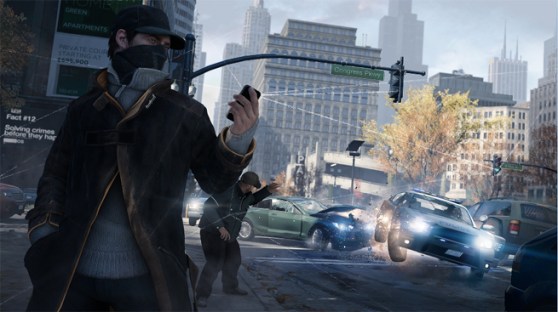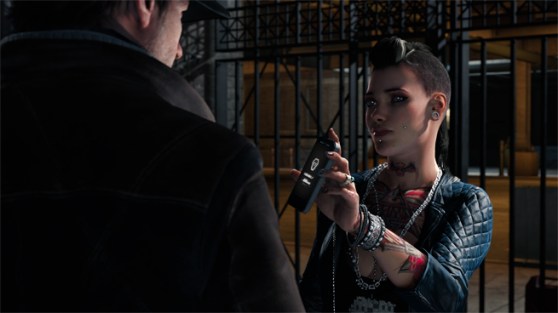If you want to see Kevin Shortt, lead story designer on Watch Dogs, geek out a little, bring up how Ubisoft completely shocked everyone when they revealed their open-world actioner to the world during last year’s Electronic Entertainment Expo.
“Wasn’t that fantastic?” says Shortt. “We couldn’t believe we surprised everybody. We were putting it up [on the show floor] and thinking, ‘It’s gonna leak, now it’s gonna leak,’ and it didn’t!”
That’s no small feat for a game centered around stealing secrets. Watch Dogs (releasing November 19 on PC and all available consoles) follows career hacker Aiden Pearce on a high-tech path to revenge in modern-day Chicago. Only this windy city’s been upgraded to a so-called “smart city” run by a central operating computer (ctOS), a system Pearce exploits to dispatch his targets … and to invade the private lives of ordinary citizens.
It’s one hell of a playground for a writer like Shortt.
GamesBeat: So you guys started out with this idea of an interconnected city. How did that become Watch Dogs?
Shortt: At the time, four years ago, we were just hearing small murmurs about smart cities. We thought, “Wow. What would that be like, if it’s in a whole city?” There are the opportunities it would give you from a gameplay perspective, but also, there are the questions it raises about privacy and information. It raises a lot of interesting issues that we wanted to explore in the game.
GamesBeat: Then you add this hero, Aiden Pearce, or an anti-hero–
Shortt: Definitely an anti-hero.
GamesBeat: He’s taken advantage of these systems in the past, and now he’s using them even more to his advantage. How do you balance that aspect?
Shortt: He’s a guy who has questionable morals. Aiden comes from a past where he’s done things wrong. He’s always been on the other side of the law, but now I think he’s trying to do things right. We don’t want people to come away saying, “Okay, he’s the guy with the cape. He’s the hero,” or “He’s the evil villain.” We don’t want those extremes. We want to find a middle ground. That’s what’s great about an anti-hero. You understand why they’re doing what they’re doing — they’re caught in a situation — but they’re willing to take steps that cross a line. Then it becomes debatable. Is he crossing the line for the right reasons?
GamesBeat: Or crossing too many lines.
Shortt: Or crossing too many lines. Part of what’s cool about our game is that the player is going to define that. They’re going to decide how many lines they’re willing to cross. A good example I can give you is in the demo, there was a husband whose wife was attacked, and he says, “I want to kill [the rapist].” So [the demo player] gets there and he said, “Well, I don’t really care what happens to him.” He lets him die. I couldn’t do that. I don’t know if this husband guy’s telling the truth. He just sent a text message to his buddy. Maybe there’s another reason here.
GamesBeat: And how does that chnage what happens next?
Shortt: Had [the demo player] stopped the crime, your reputation would have gone up. People would have heard about it and that affects how they respond to you in the future. If you’d just let him go, well, that’s one of those things you have to live with. You didn’t commit the crime. You just turned your back on it.
But I can give you another good example. Remember the guy with the baseball bat? He takes off, and Aiden chases after him. We could have intervened much earlier and knocked him out, just stopped it right there. That would have been positive across the board, because you stopped him from beating the crap out of the other guy. [The demo player] let it go, the guy started shooting, so we had to use more extreme measures. You pay for those extreme measures. Yes, we saved the other guy and Aiden got a positive reputation out of that, but he had to kill someone to do it. That gave him a bit of a negative hit.



